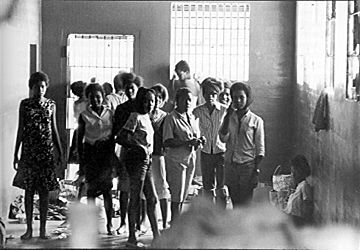Leesburg Stockade facts for kids
The Leesburg Stockade was an important event during the Civil Rights Movement. It happened in 1963 in Leesburg, Georgia. A group of African-American girls, some as young as 12, were arrested. They were protesting segregation, which meant Black and white people were kept separate. These girls were held in a building called the Leesburg Stockade. They were kept there for 45 days without any charges. The conditions were very bad. These young prisoners became known as the Stolen Girls.
Contents
Why the Girls Protested
In 1963, many places in the United States were segregated. This meant Black people and white people had separate schools, bathrooms, and even movie theaters. This was unfair and against the law. Many people worked to end segregation. This effort was called the Civil Rights Movement.
A Protest in Americus
In July 1963, a group called the Student Nonviolent Coordinating Committee (SNCC) helped organize a protest. They worked with the National Association for the Advancement of Colored People (NAACP). The protest happened in Americus, Georgia. People marched from a church to a movie theater. This theater was only for white people.
Arrested for Standing Up
As part of the protest, some young women tried to buy tickets at the movie theater. They wanted to show that segregation was wrong. For trying to buy tickets, they were arrested. After a short time in Dawson, Georgia, the girls were moved. They were taken to the Leesburg Stockade. About 15 to 33 young women were held there.
Life in the Stockade
Some of the girls held at the stockade were very young. Some were only 12 years old. The building was not a proper jail. It was a public works building. The conditions inside were terrible.
Harsh Conditions
The girls had to sleep on hard concrete floors. There was only a shower for water, and it just dripped. The toilet did not work. They were given very little food. The people in charge did not tell the girls' parents where they were. The parents only found out with help from a janitor.
Threats and Fear
The young women faced scary threats. At one point, a rattlesnake was even thrown into their cell. This was a very frightening experience for them.
Freedom at Last
A photographer named Danny Lyon took pictures of the girls. These photos showed how bad the conditions were. The SNCC and a senator named Harrison A. Williams used these photos. They shared the story to make people aware. After the public learned about the situation, the girls were released. They were not charged with any crimes. However, they were still made to pay a fee for being held there.
Remembering the Stolen Girls
The story of the Leesburg Stockade and the Stolen Girls is an important part of history. Their bravery helped bring attention to the unfairness of segregation.
Honors and Recognition
In 2007, two of the girls, Carol Barner Seay and Sandra Russel Mansfield, were honored. They were added to the Hall of Fame at the National Voting Rights Museum. In 2016, the National Museum of African American History and Culture shared their story. This museum is part of the Smithsonian Institution. The state of Georgia also recognized them.
Historical Marker
On September 27, 2019, a special marker was put up at the stockade. The Georgia Historical Society placed this marker. It is part of their Civil Rights Trail. The marker helps people remember what happened there.
Girls of the Stockade
The young women arrested included:
- Carol Barner Seay
- Lorena Barnum
- Gloria Breedlove
- Pearl Brown
- Bobbie Jean Butts
- Agnes Carter
- Pattie Jean Colier
- Mattie Crittenden
- Barbara Jean Daniels
- Gloria Dean
- Carolyn Deloatch
- Diane Dorsey
- Juanita Freeman
- Robertiena Freeman
- Henrietta Fuller
- Shirley Ann Green
- Verna Hollis
- Evette Hose
- Mary Frances Jackson
- Vyrtis Jackson
- Dorothy Jones
- Emma Jean Jones
- Melinda Jones- Williams
- Emmarene Kaigler
- Barbara Ann Peterson
- Annie Lue Ragans
- Judith Reid
- Laura Ruff
- Sandra Russell
- Willie Mae Smith
- Eliza Thomas
- Billie Jo Thornton
- Lulu M. Westbrook
- Ozeliar Whitehead
- Carrie Mae Williams
 | Dorothy Vaughan |
 | Charles Henry Turner |
 | Hildrus Poindexter |
 | Henry Cecil McBay |


